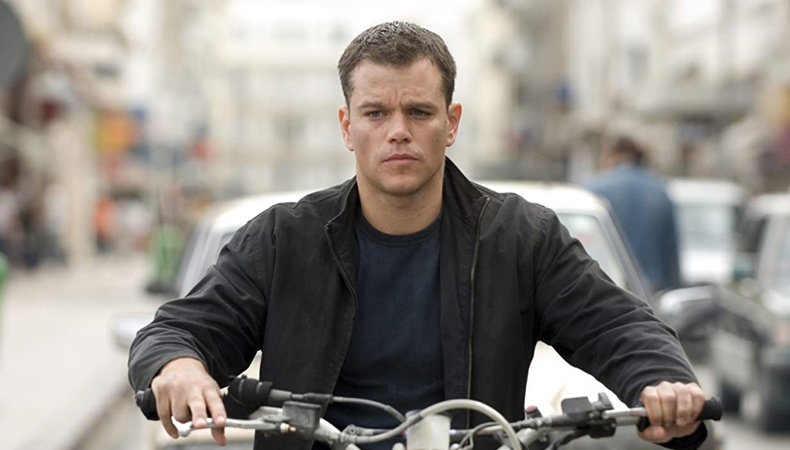
Photo Source: Universal Pictures
Karen Baker Landers knows that many people conceive of sound design and editing as technical—not creative—parts of the filmmaking process. But at its core, she argues, sound is about storytelling and communication, both between a film and its audience and between a designer and their director. Baker Landers, who is part of the Formosa Group and a two-time Academy Award-winner for sound editing, got her start contributing sound effects to the cult classic “Goonies” before tackling soundscapes for films like “Skyfall,” and “The Bourne Ultimatum.”
Talking to Backstage, Baker Landers describes how doors can communicate a great deal about a sound editor’s storytelling ability and how vital creative curiosity is to great sound design.
What does a supervising sound editor do?
It starts with [a] creative conversation with the director about the approach to the sound design on the film. Once I read the script and go through the director’s thoughts, I’ll create a budget for that particular film based on what I think it’s going to need. Then I put [together] a crew.
Usually, I start by going through the film by myself and watching it, kind of getting ideas, and continuing that conversation with the editor and the director. Then the crew will get together and we’ll divide up who’s gonna tackle what and continue the creative process. The creative thread of the sound on a film would be the sound supervisor, that goes all the way from the conception to the end of the mix. In between, [the job is] also wrangling and managing schedule and crew and conversations with the studio.
How did you get started in sound editing?
I was always drawn to sound; I was always intrigued by it. When I was 11, my parents bought me a tape recorder and I used to walk around the house and record stories just with sound. As I went through high school and was getting ready to go to college, I thought, “maybe there’s something to this,” but it wasn’t something people talked about, even in our student films. You just weren’t taught to do that. We had two designers come and speak to us, Richard Anderson and Mark Mangini. They were speaking about sound design and I basically was like, “oh my god, this is it,” and I went up and asked if I could work for them, for free, as an intern. And that’s how I started, with them, and just kind of worked my way up.
What was your first film crew job?
My first job was on “Goonies.” I remember the sound supervisor showed me something on the screen and then he said “go try to find us something that can make that sound” and it was a scene where the guys in the movie are cranking up a bucket from a deep well. They wanted something interesting for that sound. I went [to] a thrift store and I found this old egg-beater that was rusty and brought it back. We tried it and they said it was great. That was actually my first sound effect in a movie, too.
What does a typical day working on a project look like?
My day start[s] when I check in with people and go through whatever they’re working on that day. You’re getting requests from the picture department, you’re dealing with the studio, you’re dealing with your crew, you’re going out and recording sounds, you’re designing sounds or working on ideas—it depends on the film.
The day is not typical but it does involve a lot of time communicating. You wear two hats: you have the creative side but you’re also responsible for a budget and managing that and knowing how to navigate the changes that might happen. I try to communicate a lot with the studio or the [post-production supervisor] to keep them informed and to develop a trusting relationship with them. Then I like to bring the director and picture editor to our studio and play [scenes for] them so we get an immediate response and can tweak things.
What do you look for when hiring your crew?
I look for somebody who’s a good storyteller, someone who is interested [in] and loves film, loves to travel, [and] understands storytelling. All we’re doing is telling the director’s story with sound. Cutting doors, believe it or not, is a good barometer for how someone is with storytelling because doors tell a lot. It’s not just what the door looks like visually but [also] the emotion of that door opening and closing. An obvious example would be in a horror film. The wrong door will stand out more than anything. Also, just being a nice person, a good collaborator. That’s actually something that’s high on my list. You try to keep it where people feel safe and happy and it’s fun.
What skills are important to have in your position?
You have to be good with people, dealing with all different types of personalities from your crew to directors. You have to be somewhat intuitive, because when I work with a director, for example, if they’re maybe not sure of what they’re looking for, sonically, I’ll ask them to tell me how they want to feel. They don’t have to tell me what they want to hear, just tell me what you want to feel and I’ll take it from there...
What’s one thing you wish everyone knew about your work?
I wish everyone knew that it’s a creative process. There are technical aspects to everything from directing to cinematography, but it’s a creative process. They don’t understand the creativity that goes into it.
What advice would you give to aspiring sound editors?
Watch movies and listen. A lot of times people will refer to another movie. “Remember that scene in such-and-such? I kind of want it to sound like this but not exactly.” So, you want to have a vast knowledge of film. Traveling is huge. Because you learn what a city sounds like. You should be able to play a city and have your eyes closed and be able to go “oh that’s Paris,” or “that’s London,” “that’s LA.” Or going into nature and looking for the unusual. The designers that I work with that are the great ones, they’ve done a lot of that. They’ve done a lot of travel, they love film, and they’re constantly out there listening.
For more on how to get work on a film crew, visit Backstage’s crew hub!
"sound" - Google News
July 29, 2020 at 01:08AM
https://ift.tt/2P79ZmY
A Supervising Sound Editor on What Makes Their Work a Creative Process - Backstage
"sound" - Google News
https://ift.tt/2MmdHZm
Shoes Man Tutorial
Pos News Update
Meme Update
Korean Entertainment News
Japan News Update
 How ‘Doctor Who’ Sound Designer Harry Barnes Went from Fetching Tea to Winning an Emmy
How ‘Doctor Who’ Sound Designer Harry Barnes Went from Fetching Tea to Winning an Emmy A Day in the Life of a Sound Editor: Ron Bochar of ‘The Marvelous Mrs. Maisel’
A Day in the Life of a Sound Editor: Ron Bochar of ‘The Marvelous Mrs. Maisel’

No comments:
Post a Comment